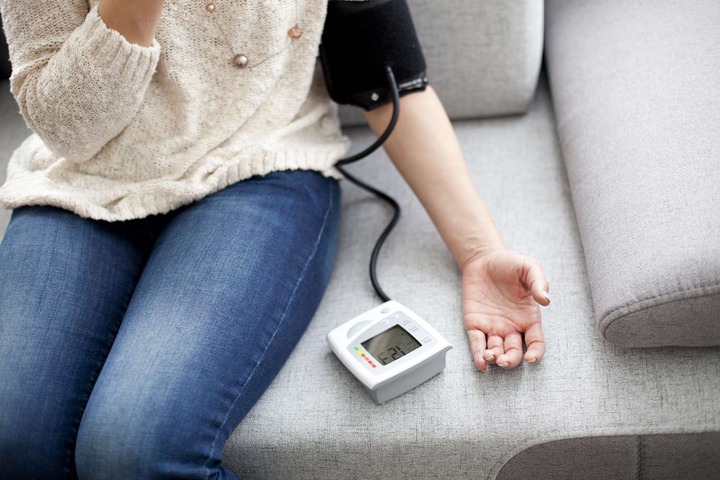
1. Alpha-Blockers
Some examples of alpha-blockers taken for high blood pressure include:
- Cardura (doxazosin)
- Minipress (prazosin)
- Terazosin
Alpha-blockers are not recommended as the first-choice treatment for high blood pressure in clinical guidelines. However, an alpha-blocker may be appropriate in some cases—for example, in a male with both high blood pressure and BPH.
Some of the concerning side effects of alpha-blockers include:
- Dizziness (especially with the first few doses)
- A drop in blood pressure (this is called )
- An increased risk of
2. Alpha-2 Agonists
Alpha-2 agonists are a class of drugs taken to lower blood pressure but are not typically a first choice of treatment, according to guidelines. They work by blocking brain signals that increase the heart rate and narrow blood vessels, which helps lower blood pressure.
Alpha-2 agonists include:
- Catapres (clonidine)
- Guanfacine
- Methyldopa
These medications are often avoided due to safety concerns. Side effects of alpha-2 agonists include:
- Drowsiness
- Dizziness
- Fatigue
- Headache
- Depression
Clonidine can also make certain heart problems worse, especially in people with heart rhythm problems, like a slow heart rate or .
3. Beta-Blockers
are not recommended as a first choice of treatment for high blood pressure, according to guidelines.
Beta-blockers work by decreasing the rate and force of the heart pumping blood, which helps lower blood pressure. Some examples of beta blockers include:
- Tenormin (atenolol)
- Lopressor (metoprolol tartrate)
- Toprol XL (metoprolol succinate extended-release)
They can also cause side effects such as:
- Fatigue
- Insomnia
- Unusual dreams
- Decreased ability to exercise
- Slow heart rate
- Rash
- Cold hands and feet
- Have a resting heart rate greater than 80 beats per minute. This is because beta-blockers can slow the heart rate.
- Have or who have had a recent heart attack because beta-blockers may improve survival after a heart attack.
4. Vasodilators
Vasodilators include:
- Hydralazine
- Minoxidil
These medications are often avoided for the treatment of high blood pressure due to their risk of serious side effects. Some of the side effects of vasodilators include:
- Headache
- Constipation
- Chest pain
- Lower leg swelling/fluid retention
- Fast heart rate
- Joint pain
Vasodilators can sometimes increase chest pain and, in some cases, cause heart problems, including heart attack, especially in people with preexisting heart conditions.
5. Loop Diuretics
There are several types of . Loop diuretics, specifically, are the most potent (strongest) type of diuretic.
Diuretics work in the kidneys. Loop diuretics work in a part of the kidneys called the loop of Henle, hence their name. Diuretics help control fluid retention () and blood pressure by helping the body eliminate water and sodium (salt) in the urine (also making you pee frequently).
Loop diuretics include:
- Lasix (furosemide)
- Bumex (bumetanide)
- Torsemide
Because of their powerful diuretic effect, loop diuretics can cause concerning side effects, such as:
- (e.g., low sodium, potassium, or magnesium). Electrolyte imbalances are more likely to occur in certain people, such as older adults and people with kidney problems, and can cause complications like heart rhythm irregularities.
- Allergic reactions.
- Damage to the inner ear, such as or hearing loss.
Alternatively, thiazide diuretics are another type of diuretic that is a first-choice treatment for high blood pressure.
What Is the First Blood Pressure Drug of Choice?
First-choice blood pressure medications, according to the American College of Cardiology/American Heart Association Guidelines, include:
- Thiazide diuretics, such as hydrochlorothiazide
- , such as Norvasc (amlodipine)
- , such as Altace (ramipril)
- Angiotensin receptor blockers (ARBs), such as Cozaar (losartan)
Your healthcare provider may recommend lifestyle modifications along with prescription drugs. For example, some possible lifestyle changes include:
- Weight loss, if necessary
- Following a heart-healthy diet with reduced salt intake, such as the
- Increased exercise (approved by a healthcare provider)
- Avoiding or limiting alcohol to two drinks per day or less for males or one drink per day or less for females
Medications That Worsen Blood Pressure
- Alcohol
- Amphetamines, such as Adderall (mixed amphetamine salts)
- Illicit substances such as ecstasy and cocaine
- Certain antidepressants, such as Wellbutrin (bupropion) and Effexor XR (venlafaxine)
- Caffeine
- Corticosteroids (steroid hormones used to treat certain inflammatory conditions)
- Certain weight-loss medicines, such as Adipex (phentermine)
- Estrogens, including
- Immunosuppressants (drugs that block parts of the immune system), such as cyclosporine
- OTC cold and cough medicines that contain an like pseudoephedrine (e.g., Sudafed)
- Certain migraine medications, such as triptans
- Nicotine
- Testosterone
This is not a full list of substances and medicines that can increase your blood pressure. Consult your healthcare provider for more information and medical advice.
